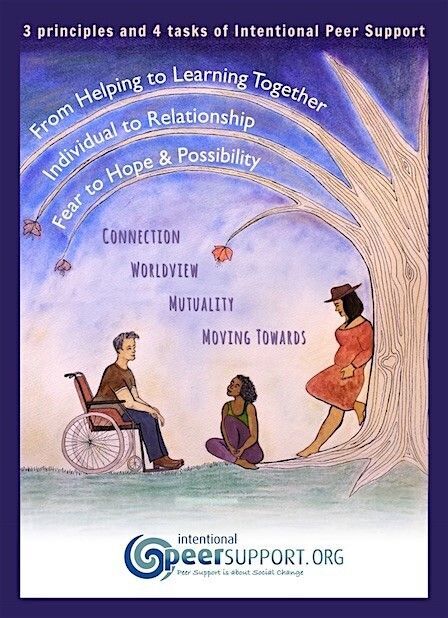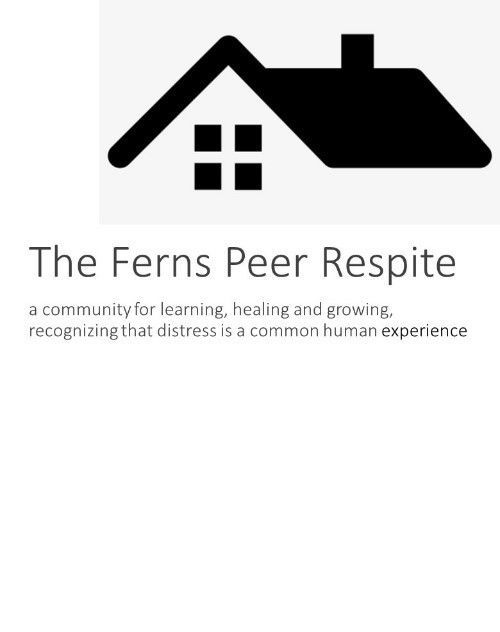Please note that The Ferns Peer-Run Respite has not opened yet. If you would like to consider another peer respite, please use the following link:
https://power2u.org/directory-of-peer-respites/
The Ferns Peer-Run Respite Council is a grass-roots organization evaluating the need for and seeking to establish peer respite in our region. HopeWorx will serve as the fiduciary for The Ferns. The Ferns will be a community for learning, healing and growing, recognizing that distress is a common human experience. To Join PRC: Contact Sarah Spath, Chair of the Peer Respite Council at sspath@theferns.org
For more information about The Ferns Peer-Run Respite Council and this initiative, please contact Olivia Kripak, the Director of The Ferns Peer Respite, at okripak@theferns.org or telephone at 610-733-0179.
Mission Statement:
To offer a welcoming environment for people experiencing distress in their lives that recognizes each individual as the expert on themself while also providing time, space, and connections that support their self-determination, healing, and growth.
What is Peer Respite?
Peer Respite is a voluntary, short-term, 24/7 model that provides support, space and relationships to people who feel overwhelmed by crisis or emotional distress. Respites allow individuals to heal and grow on their own terms.
Peer Respite is a proven alternative to psychiatric hospitalization or crisis residential services in that it offers community-based non-clinical support. Guests can stay up to 7 days and have the freedom to utilize supports and skills that further their healing journey. We only ask that all our guests and staff adhere to our community guidelines which promote respect, healing, safety, and connection.
The hope and reality behind peer respites is that psychiatric emergency services can be avoided if less coercive or intrusive supports are available in the community. This transformative model views emotional distress as a common human experience through which guests can find meaning and growth as part of a healing community.
(Excerpts from The Ferns Peer Respite business plan and Live & Learn, Inc.)
To get a better idea of what a peer respite is like, please take a look at this short video from Afiya.
We've published our first newsletter! You can find it here.
All staff will be trained in Intentional Peer Support, a trauma-informed peer support model used around the world.

When fully operational, The Ferns Peer Respite will serve approximately 156 people annually. Some guests will identify as having been diverted from a hospital stay. If even just a portion of those individuals are diverted from inpatient hospitalization, the estimated cost savings to the system will more than justify the costs of launching and operating The Ferns Peer Respite.
What it is and What it isn't
IS
An additional crisis resource for those needing extra support
A home-like environment with team members there 24/7
A space that values the individual as the expert on themselves and their needs
An opportunity to use connection through sharing lived experience to achieve increased wellbeing
An environment that holds those present to agreements of safety, respect, and responsibility
ISN’T
A locked down, involuntary space
An option for detox or medication management
A clinical setting with required participation, diagnosis, insurance, or referral
A space that doesn’t uphold community guidelines and considerations in order to ensure safety and healing
A resource that requires rights and freedoms be lost in order to ensure safety
Cost-Benefit Analysis
■ Respite guests were 70% less likely to use inpatient or emergency services.
(Croft & Isvan, 2015).
■ Statistically significant improvements in healing, empowerment, and satisfaction. (Greenfield et al., 2008)
■ Average psychiatric hospital costs were $1,057 for respite-users compared with $3,187 for non-users (Greenfield et al., 2008)
■ Respite guests experienced greater improvements in self-esteem, self-rated mental health symptoms, and social activity functioning compared to individuals in inpatient facilities
■ The expansion of peer respites in recent years reflects increased calls for person-centered crisis alternatives among service users and their families, advocates, and behavioral health administrators (Pelot & Ostrow, 2021)
Informed by Q3 2021 data from the Pennsylvania Health Care Cost Containment Council (PHC4)
Help us bring peer respite to our region.


